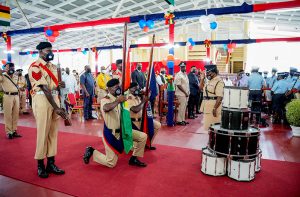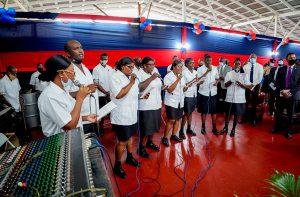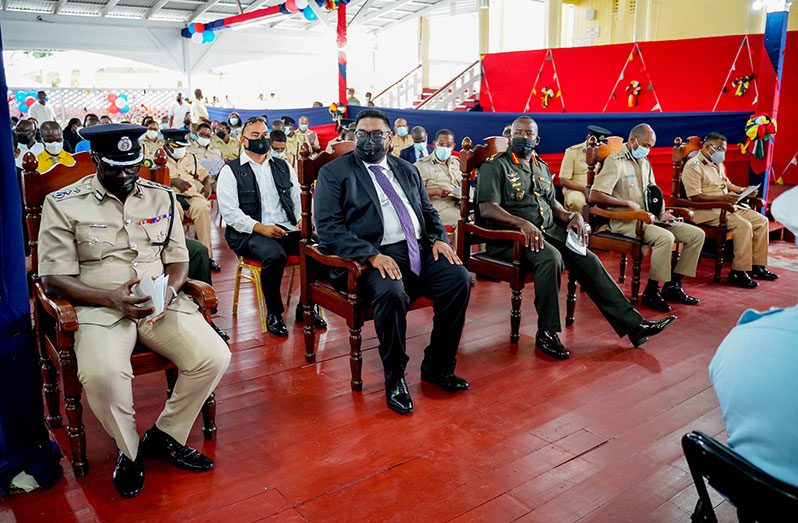THE Guyana Police Force (GPF) on Thursday kicked off its 182nd Anniversary celebrations with the traditional Drum-Head Service at the Police Officers’ Mess on Eve Leary.
President, Dr. Irfaan Ali on Thursday morning witnessed the traditional piling of drums and laying of flags during the Force’s Drum-Head Church Service to commemorate the occasion.
The Drum-Head Service is the precursor to a series of activities to commemorate the establishment of the Police Force here on July 1, 1839.
Then called the British Guiana Police Force, the entity started with 245 ranks. Today, the institution has several thousand members at posts all over the country.
President Ali, who was accompanied by Home Affairs Minister Robeson Benn and several members of the Joint Services, believes that a stronger Force would help to bolster the economic development that will revolutionise Guyana.
In outlining his vision for the Guyana Police Force at their annual Officer’s Conference held in March, the Commander-in-Chief had coined the term “Smart policing” as in S.M.A.R.T: Systems, Manpower, Attitude, Reliability and Technology.
IMPORTANT COMPONENT

He has said, ad nauseam, at numerous forums that technology is an important component of the overall process of repositioning, restructuring, rebranding, re-organising, retooling and repairing the Force’s image and service delivery.
During the feature address at the commissioning of a Computer Training Centre at the Cove and John Police Station on the East Coast Demerara last week, the President had again explained the importance of technology and people-centred policing.
At that event, the President announced that work was already underway to expand the Smart City programme, which will see greater technological use, including surveillance cameras, to aid crime-fighting and intelligence gathering.
“That is why easy access to technology and the training component that comes with it is such an important part of un-learning and re-learning to meet the future requirement demand. Part of leading is to create an efficient environment, one in which people have belief in the systems, and one in which the system itself is efficient; not where files are misplaced and lost. One in which there is traceability, so that there is greater accountability. That is what technology helps us to do; that is the direction we’re heading in,” President Ali said.
LONG-STANDING TRADITION

Chairman of the proceedings, Deputy Commissioner (Administration) (ag), Calvin Brutus, explained that the Piling of the Drums goes back to a long-standing military tradition of dedication used to receiving divine blessings and protection prior to engaging in battle. Such practice, he added, emerged due to situations in shifting battlefields, and the inability to access religious sanctuary. A convenient location is therefore identified in the field, and the drums are arranged to perform the sacred function.
Being a paramilitary organisation, the GPF adopted this tradition among many others in existence. The regimental banners were substituted by the National Flag and the Police Flag, respectively. Acting Police Commissioner, Nigel Hoppie; National Security Adviser, Captain Gerry Gouveia; Chief of Staff of the Guyana Defence Force, Brigadier Godfrey Bess; and other high-ranking GPF officers were also in attendance. In his message to mark the occasion, Reverend Dr. Murtland Raphael Massiah charged the leadership of the Force to have a keen sense of vision, to improve on the progress that has occurred since its establishment in 1839, telling them that they must now run their leg of the relay.
“If you do not understand your mission, you will not be able to achieve the level of success that you have set up, or those who plan and organise the programme have determined. Leaders not only have a keen sense of mission, but leaders must leverage the power,” Massiah said.
He reminded the ranks of their role as part of a collective, telling them that when one member of the GPF does not uphold their duty, the entire Force is criticised. He reminded them that they must be mindful of this, and that every rank must understand that they have a duty to uphold and to protect the integrity of the institution.
He also advised the members of the Force to ensure that they not only seek advice, or work based just on the advice given by their adviser, but that they must also take the time to ensure that they do their own research to gather what the public expects of them, and how their performance can be improved.
He further advised the ranks to adapt to the changes in society, and to embrace the use of technology to ensure that they can better fulfil their mandates. He reminded the ranks that leaders must be able “to adapt to adversity”, and use it to improve the overall performance of the Force.
He also reminded the ranks that their leaders need timely and accurate information, and that they need to provide that information to help bridge the gap between the public and the police force. “We must never reach a place where we become producers of false information; we have to deliver our nation from that kind of environment. And you, as the Force, you have a role to play. Please serve the people,” Massiah charged the ranks. (Office of the President)



.jpg)










